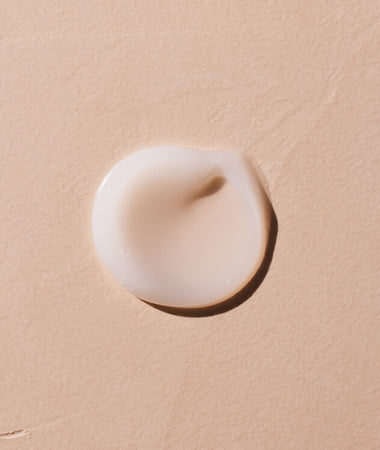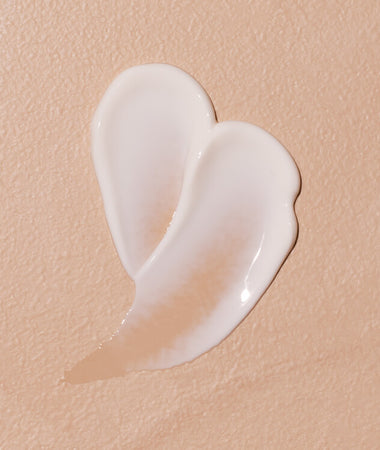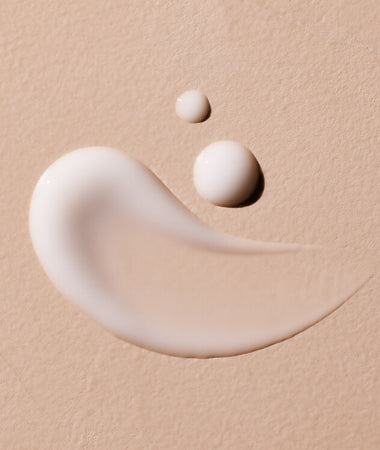
Breastfeeding Facts: Everything You Need To Know
New and expecting mothers talk a lot about breastfeeding, and for good reason — it’s part of the amazing miracle of bringing a child into this world and the power of a woman’s body! But with so much information, it’s hard to separate breastfeeding facts from breastfeeding fiction.
Don’t worry! Here at Mustela, we’ve put together a list of 17 important breastfeeding facts to help you understand how breastfeeding nourishes your baby, helps to keep both of you healthy, and reinforces the bond between you and your little one.
Ready to learn? Let’s take a look!
16 Important Breastfeeding Facts
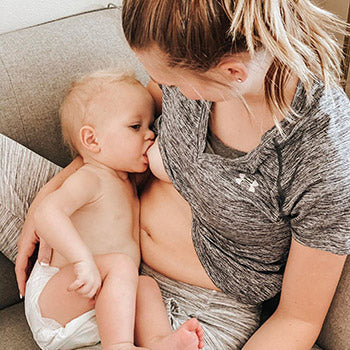
1) Breast Milk Provides Perfect Nutrition For Your Baby
Not only does your breast milk provide all the nutrients your baby needs, but it also contains the perfect quantities and is more easily digested than formula or cow’s milk.
The American Pregnancy Association says, “Breast milk has the perfect combination of proteins, fats, vitamins, and carbohydrates. There is nothing better for the health of your baby.”
When it comes to vitamins, just remember that the amount of vitamins in your breast milk is affected by what you eat. That’s one of the reasons that a healthy breastfeeding diet is so important!
For tips on how protein, fruits, processed food, veggies, snacks, and caffeine play into a healthy diet while you’re nursing, read our article here.
2) Your Body Produces Colostrum Before Breast Milk
Even before that nutrient-rich breast milk comes along, your body produces something called colostrum.
In the first couple of days after your baby’s birth, your breasts produce this thick, yellow fluid chock-full of minerals, proteins, and antibodies for your newborn.
Feeding your newborn frequently aids in the production of regular breast milk, which will come in around two to three days after giving birth.
3) Breastfeeding Boosts Your Baby’s Immune System

Breast milk provides so many benefits for your baby! Did you know that it boosts your baby’s immunity and can help keep them from getting sick?
All of the antibodies and other goodies in breast milk help to equip your little one’s body to fight off ailments like respiratory tract infections, urinary tract infections, and other illnesses.
The United States Office On Womens’ Health (womenshealth.gov) says, “Breastfeeding lowers the risk of ear infections, diarrhea, and stomach problems.”
4) Breastfeeding Is Good For Your Child’s Long-Term Health
Not only will breastfeeding help keep your baby healthy right now, but it’s also good for their long-term health and development. The benefits of breastfeeding can be seen well into childhood.
Little ones who are breastfed have a lower risk of childhood conditions and diseases like diabetes, asthma, and obesity.
5) Breastfeeding Is Ideal Bonding Time
You might not think about it when you’re nursing your little one, but it’s a special bonding moment between the two of you!
First of all, newborn babies can only clearly see things that are about a foot away. When you nurse, your face is within that range and your baby is able to take a good look at you!
But that’s not the only reason that breastfeeding is a special time for you and your baby. It also provides a perfect opportunity for skin-to-skin contact, which is important for your baby right after birth as well as all throughout their infancy.
This contact comforts your little one and reinforces the parent-child bond.
In addition to nursing, what are some other ways to be sure to get skin-to-skin contact every day? Give your little one a baby massage, bathe your baby, or simply let them lie on your bare chest (tummy time, anyone?).
If you give your baby a massage, be sure to use a moisturizing, hypoallergenic, and gentle baby oil, like Mustela’s Baby Oil, to create a soothing and comforting experience.
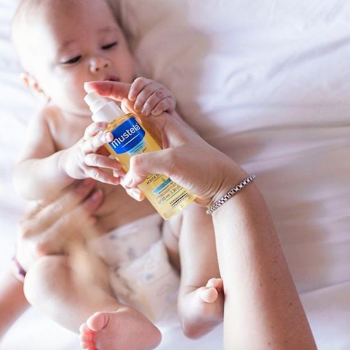
Our protective oil is composed of 99% plant-based ingredients and enriched with an elixir of pomegranate seed oil, sunflower seed oil, and avocado oil. And you can rest assured that it’s free of parabens, phthalates, and phenoxyethanol.
We also recommend our Melting Massage Balm. It’s designed to moisturize and nourish your baby’s skin, leaving it supple and soft. Composed of 100% ingredients of natural origin, this balm has a luxurious texture perfect for baby massages.
If you’re not sure how to go about giving your little one a massage, read all about it here.
6) Breastfeeding Helps You Get Back To Your Pre-Baby Body

In more ways than one, breastfeeding helps you get your pre-baby body back — both inside and out.
As far as losing your baby weight, The United States Office On Womens’ Health (womenshealth.gov) says that “Breastfeeding may also help you to lose weight. Mothers who exclusively breastfeed can burn as many as 600 calories a day, which may help you get back to your pre-pregnancy weight.”
How does breastfeeding help you get back to your pre-baby body on the inside? A hormone called oxytocin is released when you breastfeed and helps your uterus return to its smaller, pre-baby size.
7) Small Breasts Can Produce Enough Milk
Your breasts will go through some changes during this time. After all, they have an important job to do!
Rest assured that no matter the shape or size of your breasts or how much they grow or don’t grow, they are capable of producing enough milk to nourish your little one. Yes, small breasts can produce enough milk.
The size of a woman’s breasts has more to do with the amount of fat rather than the size of the mammary gland. The only difference is that smaller breasts might not hold (or store) as much breast milk as bigger breasts.
This is no problem, though. You can simply nurse your baby more often.
8) Your Breast Milk Is Healing
Dabbing a bit of breast milk onto sore or cracked nipples might seem like an old wives tale, but it’s not!
According to The United States Office On Womens’ Health (womenshealth.gov), “Breastmilk is filled with special components that help fight infection and cut down on swelling in the breast.”
To take advantage of your milk’s antibacterial properties, gently apply a few drops of breastmilk to your nipples after feeding your baby, then let them air-dry.
Applying Mustela’s Nursing Comfort Balm is another way to naturally care for your nipples! This lanolin-free balm moisturizes and protects nipples, eases discomfort, and helps to replenish and restore skin during and after breastfeeding.
Made with 100% naturally derived and food-grade ingredients, our fragrance-free balm has a neutral smell and taste, won't stain your clothing, and is safe for both you and your little one.
It’s also enriched with vitamin E, olive oil, and plant-based glycerin to nourish, moisturize, and protect your skin. Nursing Comfort Balm is designed for nursing mothers, backed by scientific research, tested under dermatological control, and proven safe for moms and babies.
Its rich texture will melt into your skin, enveloping it in a delightful moisturizing barrier.
9) Breastfeeding Is Recommended For The First 6 Months
As we’ve seen, breastfeeding is great for both mama and baby! It’s the ideal way to feed your little one for the first few months of their life.
The World Health Organization (WHO) and the American Academy of Pediatrics (AAP) both recommend exclusively breastfeeding for at least the first six months of your baby’s life.
Your little one can start trying solid food around six months old, but that doesn’t mean breastfeeding has to stop! Breastfeeding can continue as long as you wish.
Speaking of which, what about when you decide to stop breastfeeding? Good question.
10) Weaning Your Baby Gradually Is Best
Another aspect of breastfeeding that you’ll put some thought into (a little later on): how and when it comes to a stop. We’re talking about weaning. But let’s define “weaning” first.
In the United States, the word “weaning” almost always refers to stopping breastfeeding — the transition from breastfeeding your baby to feeding them only solid food.
But this word can mean something slightly different in other countries! Namely, the introduction of food other than formula or breastmilk.
That said, in this article, we are speaking of weaning your baby off of breastfeeding. And the truth is that there’s no right time to do it. It’s completely up to you.
As we mentioned, it’s recommended that you breastfeed exclusively for your baby’s first six months of life. However, after you add solid foods to your baby’s diet, you can still continue to breastfeed, too.
Once you decide that it’s time to come to an end, how should you go about weaning? For both you and your baby, the best way to do it is gradually over a few weeks. This allows both of you to emotionally and physically get used to the change.
While that is the ideal situation, life happens and there are multiple reasons that might lead you to stop nursing all of a sudden. Don’t fret!
Take care of yourself and contact your doctor if you have any concerns or think you might be developing a breast infection.
11) Breastfeeding Is Eco-Friendly And Economical

In addition to being healthy for you and your baby, there’s no doubt that breastfeeding is eco-friendly and economical, too.
When you nurse instead of purchasing formula, you’re saving money as well as cutting out the manufacturing that goes into formula and the packaging that ends up in the landfill.
If you’re as invested as we are in eco-friendly living, check out this article that lists eco-friendly baby products. Between skin care, feeding, and toys, it’s got you covered!
12) Finding The Right Breastfeeding Position Is Important
For some mother-baby pairs, breastfeeding comes as naturally as breathing. Other moms and babies struggle to get the hang of it.
For any mother, one of the most challenging aspects can be finding the right breastfeeding position. Why is the right position so important?
If you and your little one aren’t in a good position, your baby might not latch onto your nipple correctly. That brings us to the next point.
13) Helping Your Baby Latch Correctly Is Essential
If your baby doesn’t latch onto your nipple correctly, it could mean that they won’t get enough milk. This can be a health concern for your little one, but it can also mean that your milk supply decreases since your body produces breast milk on a supply-and-demand basis.
A poor latch may also put you through some unnecessary pain. It can make breastfeeding uncomfortable for you and put you at risk for soreness or cracking.
Experiment with some of the common breastfeeding positions to see what works best for you and helps your baby latch on without a problem. Also, don’t hesitate to talk to a lactation consultant about any breastfeeding concerns you might have!
You can read more about breastfeeding latch tips here.
14) Taking Care Of Yourself Is Part Of Breastfeeding

We’ve already talked about taking care of your breasts with a nipple cream like our Nursing Comfort Balm. But taking care of yourself goes far beyond just that!
Good habits such as managing your stress, relaxing, and eating healthily will not only benefit you but also your breast milk production and your baby.
It’s important to take care of yourself for the sake of it, too! Your body has just carried your little one during pregnancy, given birth, and is now producing milk on a daily basis. And you as a new mom have a lot on your plate.
Remember to be kind and compassionate to yourself.
15) You Can Get Pregnant While Breastfeeding
While some women may think that getting pregnant while breastfeeding is impossible, that’s simply not true.
Although the hormones that go along with nursing suppress ovulation, the fact is that you can get pregnant while breastfeeding.
In the same vein, most doctors recommend that you wait to have sex until four to six weeks after delivery. Since every body is different, ask your doctor for their recommendation about when you can have sex and how long you should wait to get pregnant again.
16) Leaking Is Normal
If this is your first time breastfeeding, you probably have a lot of questions about what is breastfeeding fact versus fiction, what’s normal and not normal, what’s healthy and not healthy.
If you have milk leaking from your breasts, you can rest easy. This is normal and natural in the first few weeks of nursing your little one. The solution? Simply place a nursing pad in your bra.
And keep in mind that the leaking will gradually decrease with time and may stop altogether.
Breastfeeding And Milk Supply

Before we wrap up, we’d like to go over one more topic that is on a lot of nursing moms’ minds: milk supply. As a mother who wants to provide for her little one, you may have some questions and concerns about whether or not you’re producing enough milk.
First, you’ll need to know if your baby is getting enough milk. How can you know? In general, if your baby is wetting and dirtying enough diapers, gaining the appropriate weight, sleeping well, and is content after nursing, you’re good to go.
That said, always take your baby to their checkups, and talk with your baby’s pediatrician if you have any concerns about their nursing or weight.
If milk supply is indeed an issue for you, showing yourself some extra TLC is in order! It’s also key to breastfeed your baby frequently. Let’s take a look at a few ways to help support healthy milk supply.
Care For Your Mental And Physical Health
Your mental and physical health have an impact on your breast milk, so caring for yourself is also caring for your little one.
We know that with a newborn, the days can be long and the nights short, but it’s important to take time to breathe deeply and do what you can to eliminate extra stress.
Spend time doing things you enjoy. Activities like going outside for a walk are a two-for-one deal since they can support both your mental and physical health!
We already mentioned the importance of a healthy diet for breastfeeding, but it’s worth reiterating! You’ll want to eat enough food since you need extra calories for nursing, and you’ll want to fill your body with high-quality, healthy food that will benefit both you and your baby.
Stay Hydrated
Hydrate, hydrate, hydrate. As a breastfeeding mom, staying hydrated is a non-negotiable! We recommend drinking one glass of water every time you nurse.
Herbal tea that’s safe for you as a breastfeeding mom is also a good option to increase your fluid intake.
Breastfeed Often
Your baby’s sucking stimulates the release of prolactin and oxytocin, two of the main lactation hormones. Since milk supply depends on the demand, nurse your baby frequently and let them empty your breast at each feeding.
Where does pumping come into play? You can support good milk supply by pumping after breastfeeding. Hand-expressing your milk is another option if your baby is finished and your breast is not empty.
Speak With A Lactation Consultant
Remember that lactation consultants are the pros! In addition to helping with positions, latching, and the like, they can also give you some tips if you’re concerned about milk production.
Know The Breastfeeding Facts

Knowing the most important breastfeeding facts can help you make informed decisions about nursing and caring for your little one. But it’s not just that!
Having all the facts can help you take care of your own body as it works tirelessly to support both you and your new baby!
Care for your breastfeeding baby with lots of love and skin-to-skin contact. And care for yourself by having plenty of patience for the difficult breastfeeding days and using Nursing Comfort Balm to soothe your sore nipples.
Breastfeeding isn’t always a walk in the park, but it’s great for you and your baby. And with a little extra attention and TLC, you can both enjoy all the benefits that breastfeeding has to offer!
- reg.
- $16.00
- Sale price
-
$16.00
- reg.
-
reg.
- Unit price
- /per
- reg.
- $23.00
- Sale price
-
$23.00
- reg.
-
reg.
- Unit price
- /per
Suggested Articles

6 Tips For Finding The Best Maternity Clothes

7 Breastfeeding Myths & Realities

The Best Postpartum Care Plan For New Mothers
Get tips, news
and exclusive offers


